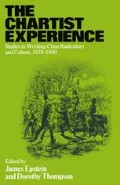Abstract
IT is twenty-two years since the publication of the volume of Chartist Studies edited by Asa Briggs. That volume set a pattern for local studies of Chartism, and in the years since its publication very many such studies have appeared. It is clear to historians of popular movements that Chartism has to be studied in the localities in which most of the activity occurred. Nevertheless many people now feel that the focus has become rather too local, and that the pattern set twenty-two years ago has in some ways limited the areas to be studied.
Access this chapter
Tax calculation will be finalised at checkout
Purchases are for personal use only
Editor information
Copyright information
© 1982 Clive Behagg, John Belchem, Jennifer Bennett, James Epstein, Robert Fyson, Gareth Stedman Jones, Robert Sykes, Dorothy Thompson, Kate Tiller, Eileen Yeo
About this chapter
Cite this chapter
Epstein, J., Thompson, D. (1982). Introduction. In: Epstein, J., Thompson, D. (eds) The Chartist Experience: Studies in Working-Class Radicalism and Culture, 1830–60. Palgrave Macmillan, London. https://doi.org/10.1007/978-1-349-16921-4_1
Download citation
DOI: https://doi.org/10.1007/978-1-349-16921-4_1
Publisher Name: Palgrave Macmillan, London
Print ISBN: 978-0-333-32972-6
Online ISBN: 978-1-349-16921-4
eBook Packages: Palgrave Political & Intern. Studies CollectionPolitical Science and International Studies (R0)

